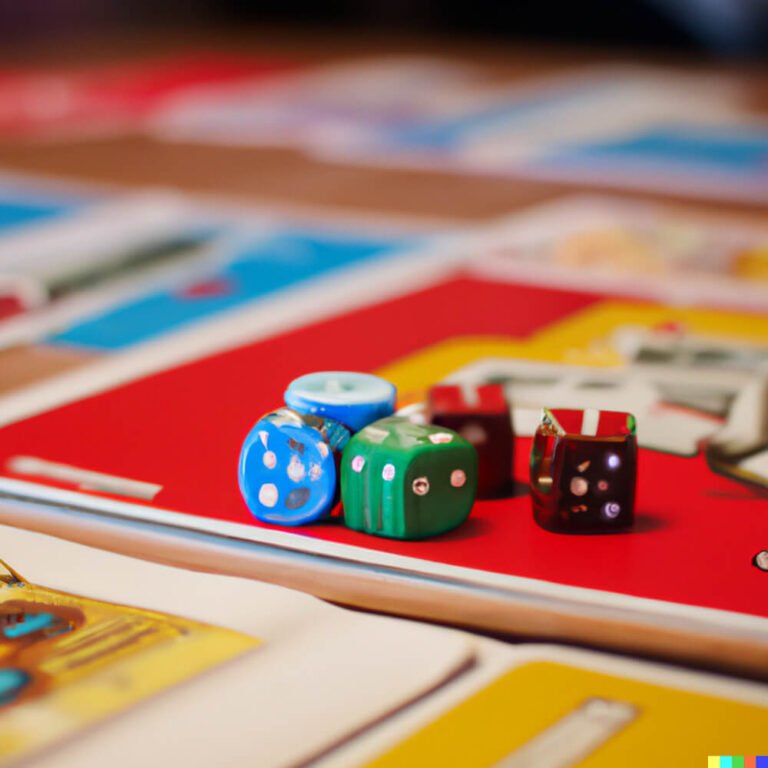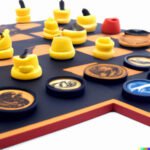Family board games have long been a cherished tradition for generations, bringing laughter, competition, and connection to households around the world. From cozy nights at home to lively gatherings with loved ones, these classic games have stood the test of time as the epitome of wholesome entertainment. In this article, we explore the best classic family board games that continue to captivate players young and old.
There is something undeniably special about sitting down with family and friends to play a board game. It’s a chance to escape digital distractions and engage in face-to-face interaction, fostering strong bonds while creating lasting memories. Furthermore, these games offer a break from the fast-paced world we live in today, allowing for quality moments of connection and relaxation.
Not only do family board games provide endless hours of fun, but they also offer numerous benefits for players of all ages. From teaching valuable life skills such as critical thinking and problem-solving to enhancing communication and teamwork abilities, these games are both educational and enjoyable. Additionally, they promote healthy competition in a safe environment, teaching players how to handle wins and losses graciously.
Join us as we delve into the world of classic family board games and discover why they hold a special place in our hearts. Explore their magic and find inspiration for your next game night adventure as we highlight the timeless favorites that continue to bring joy and laughter to countless households worldwide.
Importance of Classic Family Board Games
Building Stronger Relationships
Playing classic family board games is not just about having fun; it also provides an opportunity to build stronger relationships within the family. In today’s fast-paced world, where everyone is constantly on their devices or engaged in their own activities, sitting down together for a board game session allows for quality bonding time. It offers a chance to connect, communicate, and create lasting memories with loved ones.
Developing Social Skills
Family board games are a great way to help children develop essential social skills. By playing together, kids learn how to take turns, follow rules, and practice good sportsmanship. They learn about winning and losing graciously and understand the importance of fair play. These skills are not only crucial for their personal growth but also transferable to other areas of life such as school and work.
Enhancing Cognitive Abilities
Engaging in classic family board games can significantly enhance cognitive abilities for both children and adults. Many of these games require strategic thinking, problem-solving, critical reasoning, and decision-making skills. For example, in games like chess or Scrabble, players need to think multiple steps ahead and analyze different possibilities before making their move. Such mental exercises help sharpen memory, improve concentration, boost creativity, and foster strategic planning abilities.
Overall, the importance of classic family board games cannot be stressed enough. Not only do they provide entertainment for all ages, but they also bring families closer together through shared experiences. The benefits of playing together include building stronger relationships among family members, developing social skills in children, and enhancing cognitive abilities for all players involved. So gather your loved ones around the table and embark on an exciting journey of fun-filled board game adventures.
How to Choose the Best Classic Family Board Game
Choosing the best classic family board game can be a challenging task with the wide variety of options available. However, considering certain factors can help you make an informed decision and select a game that suits your family’s preferences and needs.
1. Age Range: Consider the age range of the players in your family. Some games are designed for younger children, while others are more suitable for older kids or adults. Look for games that have age recommendations on the box to ensure that they are appropriate for everyone playing.
2. Game Length: Think about how much time you have available to play a board game in one sitting. Some classic family board games can take several hours to complete, which may not be ideal if you prefer shorter game sessions. On the other hand, if you enjoy longer games or have ample time to play, a lengthier game might be perfect for your family.
3. Difficulty Level: Take into account the complexity of the game and the skill level required to play it. If you have younger or less experienced players, simpler games with straightforward rules might be better suited for your family. On the other hand, if you enjoy strategic thinking and intellectual challenges, opt for games that offer more complexity and depth.
4. Theme or Subject Matter: Consider the themes or subject matters that interest your family members. Classic family board games come in various themes such as fantasy, mystery, history, or wordplay. Choosing a game with a theme that aligns with your family’s interests can enhance engagement and enjoyment during gameplay.
5. Replay Value: Look for board games that offer high replay value by providing different scenarios or outcomes each time they are played. Games with randomized elements or multiple paths to victory tend to have greater replayability as they offer new challenges and experiences with each playthrough.
By considering these factors when choosing a classic family board game, you can ensure that it will be enjoyable and engaging for everyone in your family circle. Whether you value simplicity, strategic thinking, or immersive storytelling, there is a perfect classic family board game out there for you to create memorable moments of fun and bonding with your loved ones.
Section on Monopoly
Monopoly is undoubtedly one of the most beloved classic family board games of all time. This iconic property trading game has been enjoyed by generations and has stood the test of time. It offers a unique blend of luck, strategy, and negotiation that keeps players engaged and entertained for hours on end.
One of the reasons why Monopoly has remained popular throughout the years is its ability to bring families together. Playing this game allows family members to spend quality time with each other, engaging in friendly competition and creating lasting memories. The game often sparks lively conversations and laughter as players strategize, make deals, and try to outwit each other.
Monopoly also teaches important life skills such as money management, negotiation, and decision-making. Players learn how to wisely invest in properties, collect rent, and build their wealth while also having to navigate unexpected expenses like taxes or landing on someone else’s property. These real-world elements of the game provide valuable lessons that can be applied in day-to-day life.
Here Are Some Interesting Facts About Monopoly
| Fact | Description |
|---|---|
| Largest Monopoly Game | The largest Monopoly game ever played had 80 participants. |
| Most Expensive Version | The most expensive Monopoly set was valued at $2 million and featured gold houses and hotels. |
| Popular Editions | There have been numerous special editions of Monopoly based on movies, TV shows, cities, and even video games. |
Section on Scrabble
Scrabble is a classic word game that has been challenging players’ vocabulary skills for decades. This popular board game is not only entertaining, but it also offers numerous educational benefits for players of all ages.
One of the biggest advantages of Scrabble is its ability to expand your vocabulary. As you form words on the game board, you are constantly searching for new and unique combinations of letters. This encourages players to think creatively and helps them discover new words they may not have known before. Additionally, the game allows you to learn about word definitions and meanings as you encounter unfamiliar terms during gameplay.
Scrabble also promotes problem-solving skills and strategic thinking. In order to achieve high-scoring words, players must carefully consider their options and make strategic decisions on where to place their tiles on the board. This requires planning ahead and analyzing various possibilities in order to maximize their score. Moreover, Scrabble teaches patience and perseverance as players face challenges such as finding ways to use difficult letters or creating words with limited resources.
Furthermore, Scrabble is a fantastic tool for improving language skills. Whether you are playing with friends or family members, this game provides opportunities for conversation and discussion about different words and their meanings. It enhances communication skills, reinforces spelling abilities, and even helps train your brain to think quickly under pressure.
Scrabble’s blend of entertainment and education has made it a timeless favorite among families around the world. Its ability to challenge vocabulary skills, promote strategic thinking, improve language proficiency, and foster meaningful social interactions sets it apart as one of the best classic family board games available today.
Section on Clue
Clue is a classic family board game that has stood the test of time, captivating players with its thrilling murder mystery theme and challenging gameplay. This section will explore why Clue is a must-have addition to any board game collection, highlighting the benefits it provides in terms of testing deductive reasoning skills and fostering critical thinking.
The Concept and Gameplay
In Clue, players take on the roles of detectives tasked with solving a murder mystery. The game board represents a mansion where a crime has taken place, and players must navigate through various rooms, collect clues, and make deductions to figure out who committed the crime, which weapon was used, and where it took place.
Each player is dealt a set of cards representing the suspects, weapons, and rooms involved in the crime. By strategically moving around the board and making educated guesses about which cards other players hold, they eliminate possibilities until they can confidently make an accusation.
Benefits for Deductive Reasoning
Clue is an excellent game for honing deductive reasoning skills. Players need to carefully analyze the clues they uncover throughout the game and use logical thinking to process information effectively. They learn how to draw conclusions based on evidence presented to them and eliminate possibilities as they narrow down their search for the truth. This encourages critical thinking, problem-solving abilities, and strategic decision-making – all valuable skills that can be transferred outside of the game setting.
Playing Clue also encourages players to think from different perspectives as they embody different characters in their quest for solving the mystery. They must consider motives and behaviors associated with each suspect, allowing them to develop empathy and understand alternative viewpoints. Additionally, since making inaccurate accusations or guesses wastes valuable turns in the game, players quickly learn to think through their deductions thoroughly before taking action – promoting careful analysis and reasoning.
Section on Chess
Chess is widely regarded as the ultimate strategy game, offering a unique intellectual challenge that has captivated players for centuries. It is a game that requires deep concentration, critical thinking, and careful planning. Chess is played on a square board divided into 64 squares of alternating colors and consists of different pieces with their own unique movements and abilities.
One of the key aspects that makes chess an ideal family board game is its ability to teach valuable life skills. Chess promotes strategic thinking, problem-solving, and decision-making abilities. Players must anticipate their opponent’s moves while also formulating their own strategies to outsmart them. This level of mental stimulation can greatly benefit children by improving their cognitive skills and enhancing their overall intellectual development.
Another important factor contributing to the popularity of chess as a classic family board game is its accessibility. Although the rules may seem complex at first, they can be easily learned through practice and patience. Chess can be enjoyed by players of all ages and skill levels, providing endless opportunities for learning and growth. It also fosters healthy competition within families, encouraging friendly rivalry while building stronger bonds among loved ones.
In addition to its educational and social benefits, chess is known for its rich history and cultural significance. Originating in India around the 6th century AD, chess has evolved over time and spread across various regions and civilizations. Today, it is recognized as a global sport with organized tournaments at both amateur and professional levels. By playing chess with family members, individuals can connect with this enduring tradition while creating cherished memories that will last a lifetime.
| Benefits of Chess | Details |
|---|---|
| Develops strategic thinking | Chess requires players to plan ahead, analyze multiple moves in advance, and think strategically to outwit opponents. |
| Enhances cognitive skills | The game improves concentration, memory, and problem-solving abilities, contributing to overall intellectual development. |
| Fosters critical thinking and decision-making | Chess helps players learn how to make sound decisions based on available information and weigh the consequences of their moves. |
| Promotes social interaction | Playing chess with family members creates opportunities for bonding, communication, and friendly competition. |
Section on Candyland
Candyland is a classic family board game that has been enjoyed by generations of children and adults alike. With its bright and vibrant colors, this game is perfect for younger players who are just starting to explore the world of board games. In Candyland, players embark on a sweet adventure through a magical land filled with candy-themed characters and landmarks.
One of the reasons Candyland is so beloved by younger players is its simplicity. The game requires no reading or counting skills, making it accessible to even the youngest members of the family.
Instead of relying on skill or strategy, Candyland is based purely on luck as players draw colored cards to determine how far they can move on the game board. This element of chance adds an exciting and unpredictable element to the game, keeping young players engaged and entertained.
Another appeal of Candyland is its immersive and imaginative theme. The game board features colorful illustrations of various candy lands such as Gumdrop Mountains, Peppermint Forest, and Lollipop Woods. Players get to navigate through these whimsical locations as they make their way towards King Kandy’s Castle, where the ultimate goal of the game lies. This fantastical setting sparks young imaginations and encourages creative thinking as they imagine themselves exploring a world made entirely out of candy.
To enhance the learning experience for younger players, playing Candyland can also be an opportunity to practice color recognition and matching skills. As players draw colored cards to move along the board, they are able to reinforce their knowledge of different colors in a fun and interactive way. Additionally, this game promotes social interaction among players as they take turns moving their gingerbread pawns, fostering communication skills and healthy competition.
Overall, Candyland remains a classic choice for families with young children due to its engaging gameplay mechanics and visually appealing design. It offers an opportunity for younger players to participate in a timeless tradition of family board games while fostering important developmental skills and creating cherished memories. So gather your family, roll the dice, and get ready for a sweet adventure in Candyland.
Section on Trivial Pursuit
Trivial Pursuit is a classic family board game that has been loved by generations. It is a knowledge-based game that challenges players’ understanding and memory in a fun and interactive way. The game was first created in the late 1970s and quickly gained popularity due to its unique concept and engaging gameplay.
One of the reasons why Trivial Pursuit is such a beloved classic is because it can be played by people of all ages. Whether you’re a young child or an elderly adult, the game offers different levels of difficulty to cater to everyone’s knowledge base. The questions cover a wide range of topics, including history, geography, sports, entertainment, and more. This allows players to showcase their expertise in various areas while also learning new facts along the way.
Another benefit of playing Trivial Pursuit is that it encourages healthy competition and critical thinking skills. With each question posed, players must rely on their cognitive abilities to recall information and make educated guesses. This not only strengthens memory retention but also enhances problem-solving skills as players strategize on how best to accumulate points.
To further enhance the gameplay experience, Trivial Pursuit offers expansion packs with additional questions on specific themes or topics. This gives players the option to tailor their gameplay based on their interests or areas they want to improve upon. Additionally, there are electronic versions of the game available that provide even more convenience and variety for players.
| Benefits | Description |
|---|---|
| Intellectual stimulation | Trivial Pursuit challenges players’ knowledge and memory, stimulating their intellectual abilities. |
| All ages | The game is designed for all ages, allowing players from different generations to play together. |
| Critical thinking skills | Players need to rely on critical thinking to recall information and make educated guesses. |
Section on Operation
Introduction
One of the most thrilling and nerve-wracking classic family board games is Operation. This nail-biting skill game has been a favorite among both children and adults for decades. With its unique concept and challenging gameplay, Operation never fails to entertain and test players’ precision.
The Objective of the Game
In Operation, players take on the role of a surgeon and must remove various ailments from their patient, Cavity Sam, without touching the metal edges of the surgical openings. The ailments range from a broken heart to water on the knee, each represented by a small plastic piece that needs to be carefully extracted using tweezers.
The aim of the game is to successfully remove as many ailments as possible without setting off the buzzer or making any mistakes. Each successful operation earns points, while mistakes result in penalties. The player with the highest score at the end of the game wins.
A Test of Skill and Steady Hands
One of the main reasons why Operation is loved by generations is that it requires steady hands and precise movements. When attempting to extract an ailment, players must navigate through narrow paths while avoiding any contact with the metal edges. The slightest slip can trigger a buzzing sound and signal failure.
Not only does Operation test physical dexterity, but it also challenges players’ ability to remain calm under pressure. As time ticks away and fellow players watch eagerly, maintaining composure becomes crucial for success. This combination of skill, precision, and nerve-wracking moments makes Operation an exhilarating experience for all involved.
Whether you’re playing with family or friends, Operation guarantees hours of entertainment and excitement. Its unique gameplay mechanics make it stand out among classic family board games, providing a thrilling challenge that will keep players coming back for more nail-biting fun.
Conclusion
Family board games have stood the test of time for a reason – they are a timeless tradition that brings fun and bonding to households around the world. The importance of classic family board games cannot be overstated, as they offer numerous benefits when played together. Not only do these games provide entertainment, but they also promote communication, critical thinking, and healthy competition among family members.
When choosing the best classic family board game, it is important to consider various factors. First and foremost, you should take into account the age range and interests of your family members. Some games may be more suitable for younger players, while others provide a challenge for older ones. Additionally, considering the duration of play and complexity of rules can ensure that everyone stays engaged and interested throughout the game.
Among the vast array of classic family board games, several stand out as beloved favorites across generations. Monopoly has captured the hearts of many with its property trading gameplay and strategic decisions. Scrabble challenges players’ vocabulary skills in an exhilarating word game format. Clue tests deductive reasoning as players solve a mystery together.
Chess offers an ultimate intellectual challenge with its deep strategy gameplay. Candyland creates a colorful adventure perfect for younger players, while Trivial Pursuit provides knowledge-based enjoyment for all ages. Lastly, Operation keeps players on the edge of their seats as they test their precision skills during nail-biting surgical procedures.
In conclusion, classic family board games hold a timeless magic that creates fond memories and strengthens familial bonds. These games not only offer entertainment but also help develop vital skills such as problem-solving, critical thinking, communication, and healthy competition. Whether it’s gathering around the kitchen table on a rainy day or during holiday celebrations, playing classic family board games will continue to bring joy and create cherished memories for generations to come.
Frequently Asked Questions
What Are 5 Classic Family Games?
Five classic family games are Monopoly, Scrabble, Clue, Uno, and Pictionary. These games have been enjoyed by families for decades and continue to bring people together for some friendly competition and quality time. Monopoly is a timeless classic where players buy, sell, and trade properties to become the wealthiest person in town. Scrabble tests your vocabulary skills as you create words from letter tiles on the board.
Clue is a murder mystery game where players must deduce who committed the crime, with what weapon, and in which room. Uno is a fast-paced card game that requires strategy and quick thinking to be the first player to get rid of all their cards. Pictionary combines drawing skills with guessing as players race against each other to correctly identify what is being drawn.
What Is the Most Popular Traditional Board Game?
The most popular traditional board game is Chess. Dating back over a thousand years, Chess has stood the test of time and continues to captivate players of all ages around the world. This strategic game provides endless possibilities with various moves and tactics that can be employed by each player.
It promotes critical thinking, problem-solving, and concentration as players try to outwit their opponent and checkmate their king. Chess tournaments attract high-level competitors globally and it has been recognized as a sport by international organizations.
What Is the Best Board Game of All Time?
Determining the best board game of all time is subjective due to personal preferences and tastes; however, one board game that often tops these lists is “The Settlers of Catan.” This German-style board game created by Klaus Teuber in 1995 revolutionized modern strategic board gaming with its unique gameplay mechanics that combine resource management, negotiation skills, and luck elements through dice rolls. Players assume the role of settlers on an uninhabited island and compete against each other to build settlements using resources obtained from various regions on the board.
The combination of skillful planning, interaction between players, and ever-changing dynamics make for an engaging and highly replayable experience. The widespread popularity of “The Settlers of Catan” has led to numerous expansions, adaptations, and international tournaments, solidifying its status as a beloved board game.

I love playing all kinds of games – from classics like Monopoly to modern favourites like Ticket to Ride.
I created this blog as a way to share my love of board games with others, and provide information on the latest releases and news in the industry.





